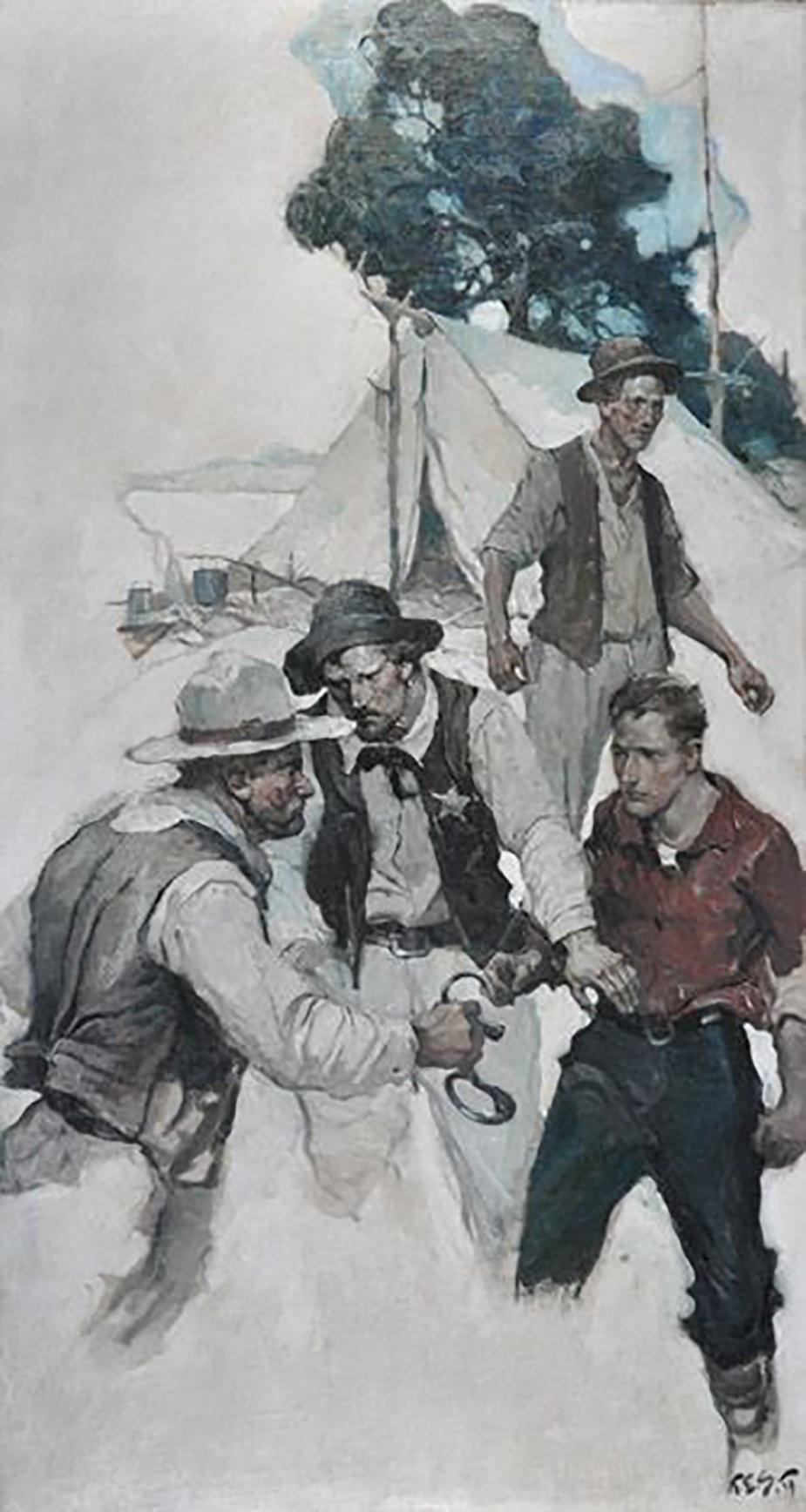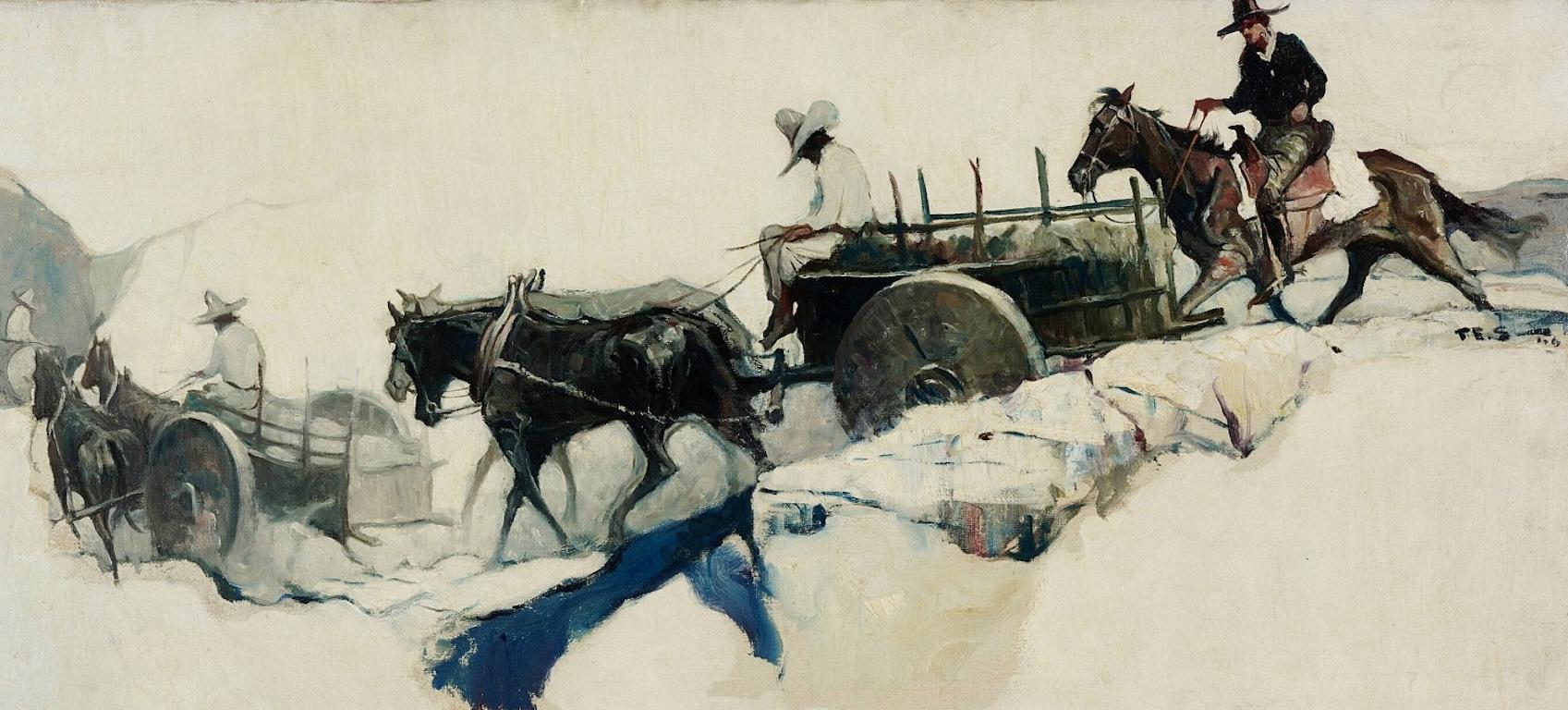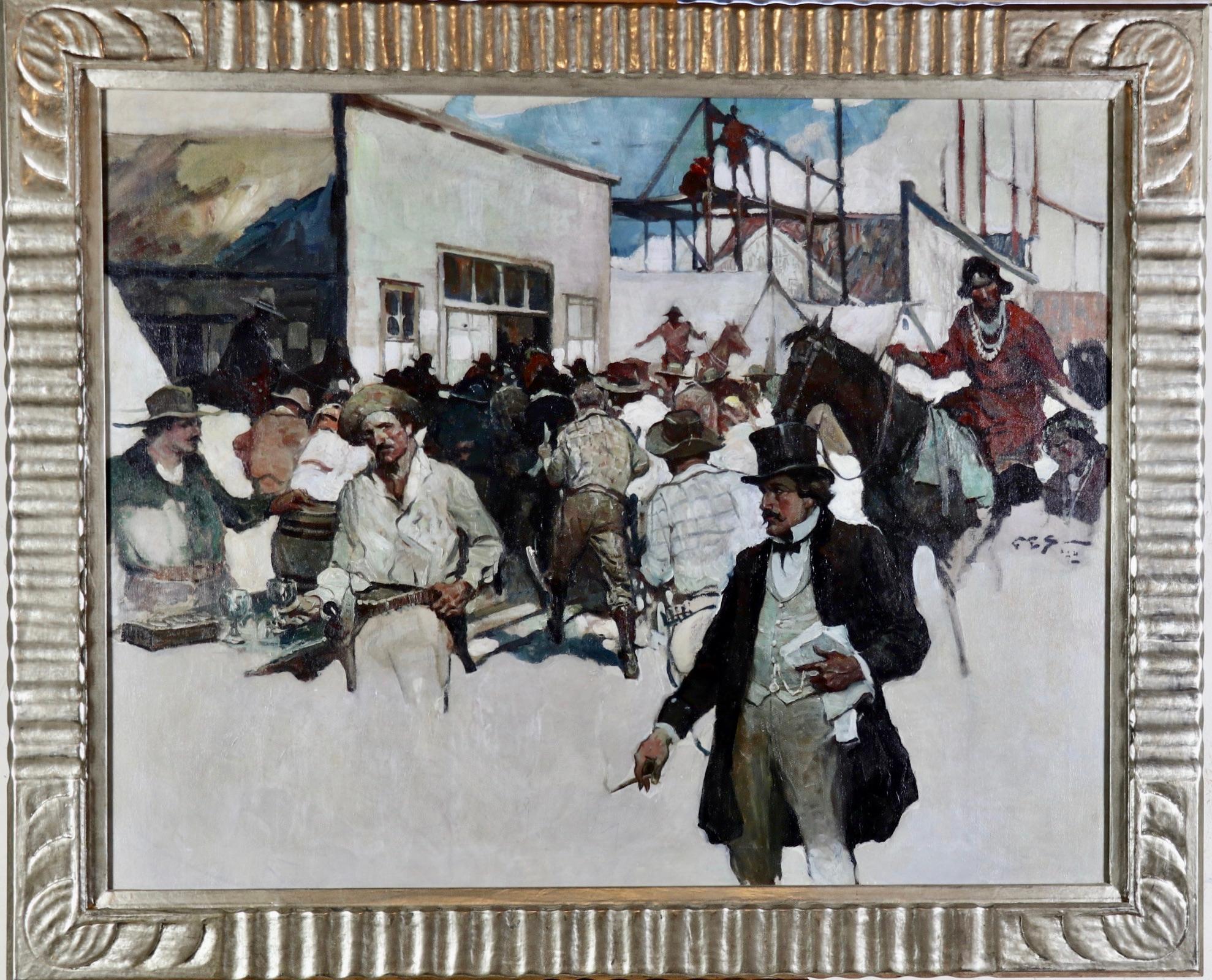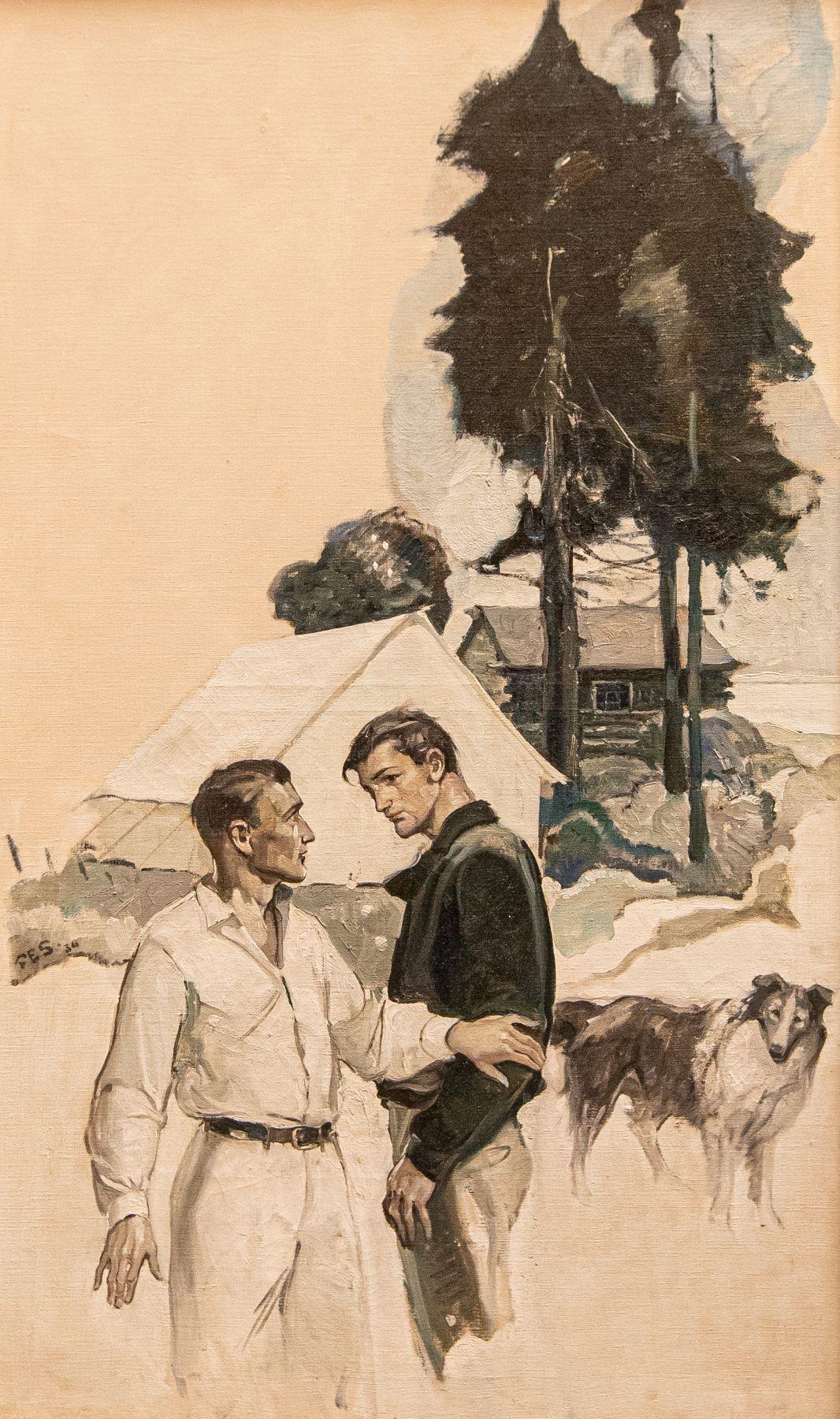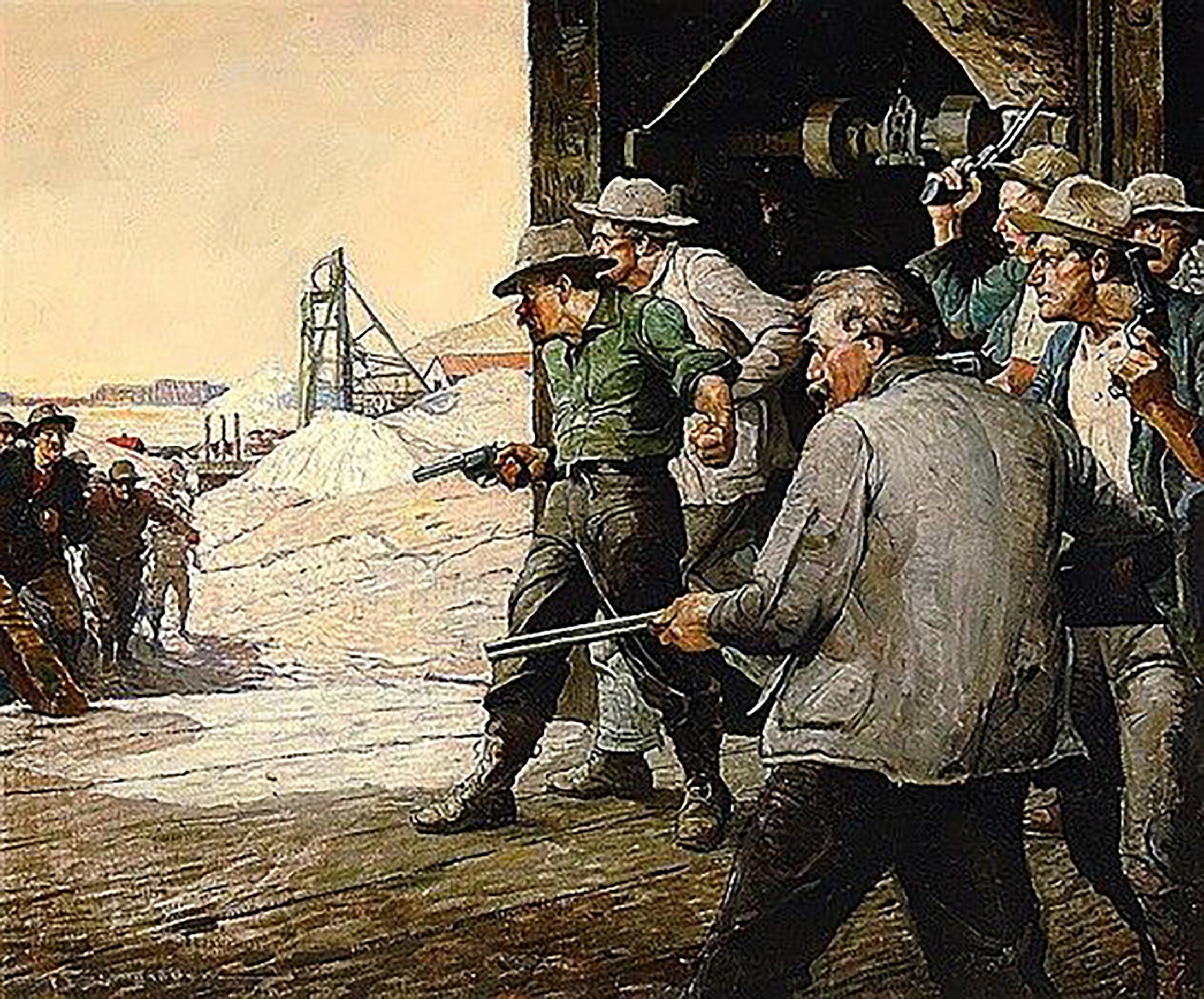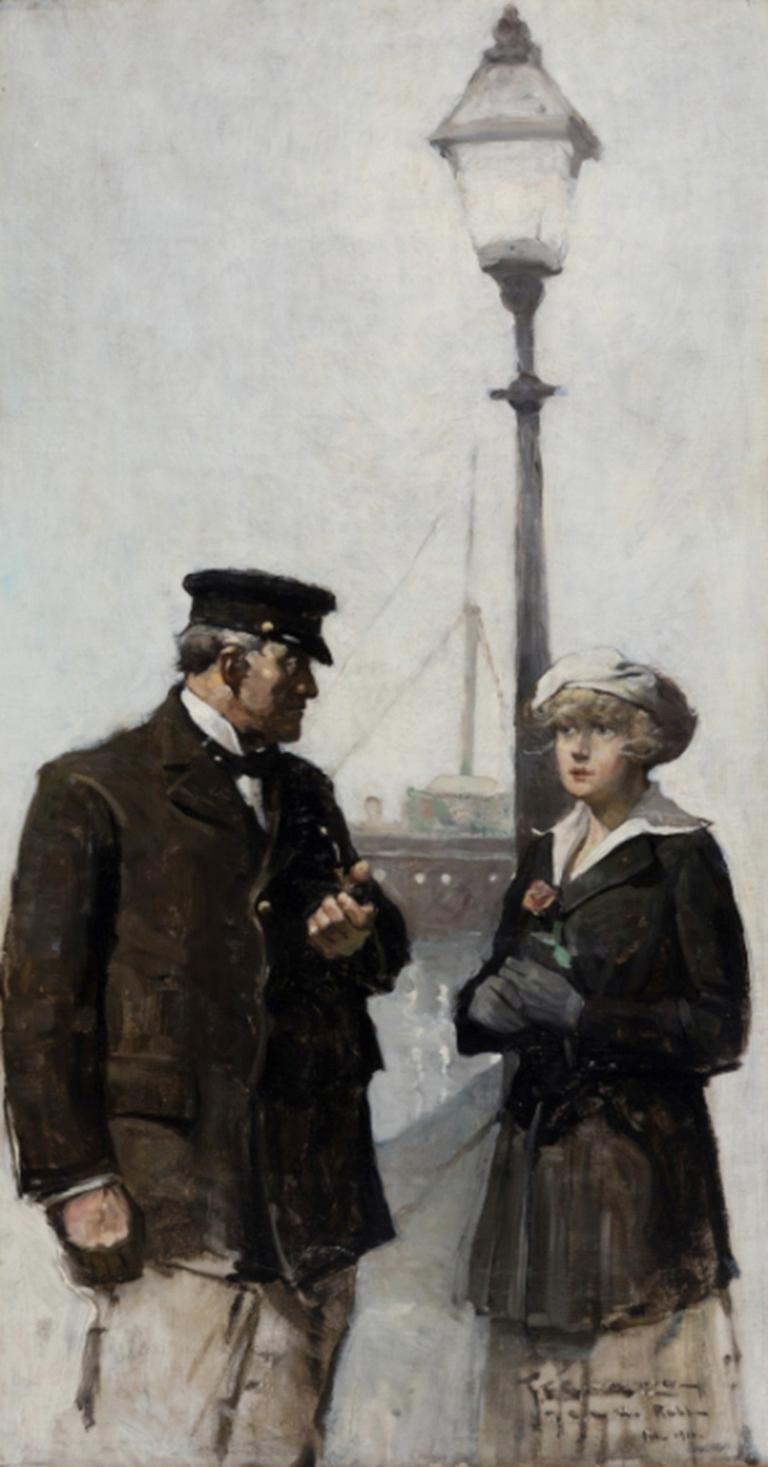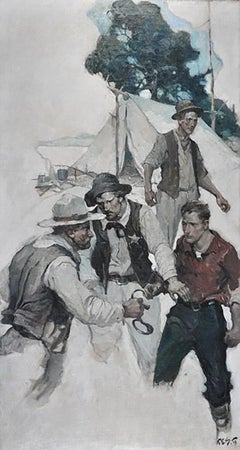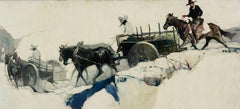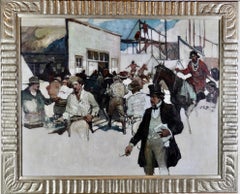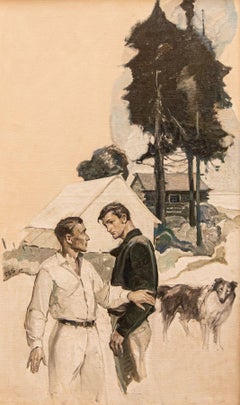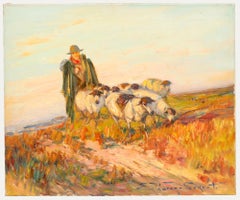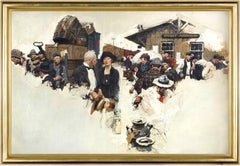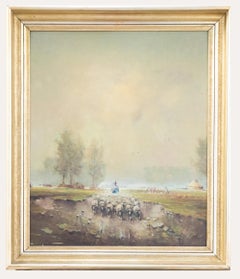Items Similar to The Sheepman Eyed Him With a Hostile Glare
Want more images or videos?
Request additional images or videos from the seller
1 of 7
Frank SchoonoverThe Sheepman Eyed Him With a Hostile Glare1922
1922
$21,500
£16,417
€18,691.33
CA$30,189.39
A$33,002.92
CHF 17,460.03
MX$394,932.96
NOK 222,153.79
SEK 203,359.32
DKK 139,612.70
About the Item
Signed & Dated Lower Right by Artist
Hendryx, James B. “The Round Seven Mystery.”
The American Boy, September 1922: 9.
caption: The sheepman eyed him with a hostile glare. ‘Why didn’t you ride right through ’em?’ he asked.
Hendryx, James B. Connie Morgan in the Cattle Country. New York: G.P. Putnam’s Sons, 1923: 96.
caption: The sheepman eyed him with a hostile glare. “Why didn’t you ride right through ’em?” he asked
Exhibitions: 1925 Washington; 1935 FAO Schwartz
- Creator:Frank Schoonover (1877 - 1972, American)
- Creation Year:1922
- Dimensions:Height: 38 in (96.52 cm)Width: 22 in (55.88 cm)
- Medium:
- Period:
- Condition:
- Gallery Location:Fort Washington, PA
- Reference Number:Seller: 45361stDibs: LU384313149142
About the Seller
5.0
Recognized Seller
These prestigious sellers are industry leaders and represent the highest echelon for item quality and design.
Established in 1995
1stDibs seller since 2016
140 sales on 1stDibs
Typical response time: 1 hour
- ShippingRetrieving quote...Shipping from: Fort Washington, PA
- Return Policy
More From This Seller
View All"The Rustlers of Silver River, " Story Illustration for Country Gentleman
By Frank Schoonover
Located in Fort Washington, PA
Medium: Oil on Canvas
Signature: Signed Lower Right
See Here Rollins
1929 Story, The Rustlers of Silver River by Zane Grey. Country Gentleman Magazine, Jan...
Category
1930s Figurative Paintings
Materials
Canvas, Oil
"He Had Found His Quarry–Now the Question Was–What To Do" Western Illustration
By Frank Schoonover
Located in Fort Washington, PA
“The Gun-Runners” by Edwin Cole, published in The Youth’s Companion, May 6, 1926, pg. 343. Western illustration
Literature: Schoonover, Smith & Dean 1450
Artwork Dimensions: 17.5...
Category
1920s Figurative Paintings
Materials
Canvas, Oil
No Longer Was Guthrie a City of Tents
By Frank Schoonover
Located in Fort Washington, PA
Initialed and dated 'FES/26' center right
Literature:
Courtney Ryley Cooper, “Oklahoma” in Country Gentleman, May 1928: 28.
Louise Schoonover Smith, LeeAnn Dean, John R. Schoonover...
Category
20th Century Paintings
Materials
Oil
Hide Rack
By Frank Schoonover
Located in Fort Washington, PA
Medium: Oil Painting
Signature: Signed Lower Left
Hide Rack
Category
1930s Figurative Paintings
Materials
Oil
Who Made it an Issue of Six Shooters, (California Mine; Copper Sky)
By Frank Schoonover
Located in Fort Washington, PA
Medium: Oil on Canvas (on Board)
Signature: Signed Lower Left
Literature:
Reese, Lowell Otus, The Little Injun, Collier's Weekly, November 4, 1916, p. 13, illustrated. Schoonover,...
Category
1910s Figurative Paintings
Materials
Canvas, Oil
Do You Think You Could Find News? - Magazine Story illustration for the Post
By Frank Schoonover
Located in Fort Washington, PA
Story illustration for “The Fugitive” by Charles Trethewey for The Saturday Evening Post, published June 26, 1915, page 14.
The full published caption reads: “‘I’ll wager the gentle...
Category
1910s Paintings
Materials
Oil, Canvas
You May Also Like
Eugen Von Warun-Sekret (1896-1963) - Oil, A Shepherd with his Flock
Located in Corsham, GB
Eugen Von Warun-Sekret (1896-1963) Original, oil on canvas. Pastoral landscape with a shepherd guiding his flock at sunset. Signed lower right.
Category
Mid-20th Century Landscape Paintings
Materials
Oil
"Lookin Back", John Cook, Oil on Canvas, Impressionism, Western, Cowboy, Horse
By John Cook
Located in Dallas, TX
"Lookin Back" is an original oil on canvas and measures 48x36 inches. This impressionistic painting is a western scene of the rider on his horse looking at the scenery behind him. Th...
Category
2010s Impressionist Animal Paintings
Materials
Canvas, Oil
Kindred of the Dust, Frontier Town Cosmopolitan Magazine
By Dean Cornwell
Located in Miami, FL
A somewhat similar Cornwell featuring a strong woman at the center of a the composition just sold at Christie's for $164,000. In this work we also see a strong woman at the center of the composition. Here she surrounded by men.
More than 20 beautifully rendered post-impressionist portraits in character, define Dean Cornwell as one of America's great artists. In his time, he was a famous as Norman Rockwell and was Norman Rockwell's favorite illustrator. "One thing puzzled Dirty Dan extremely. That was the perfectly frank, friendly manner in which his employer and this outcast woman greeted each other, the earnestness with which they conversed, and the effect of the woman's low-spoken words upon the color of Hector McKaye's face."
Morris Weiss collection...
Category
1920s Post-Impressionist Figurative Paintings
Materials
Oil
Eric Stapel (1902-1976) - 1949 Oil, Shepherd and Flock
Located in Corsham, GB
An atmospheric oil study depicting a shepherd leading his flock through a misty field. Signed to the lower left. Signed, inscribed and dated to the reverse of the board. On board.
Category
Mid-20th Century Landscape Paintings
Materials
Oil
$262 Sale Price
20% Off
Shepherdess and sheep at the sheepfold
Located in Genève, GE
Work on canvas
Category
Mid-19th Century Landscape Paintings
Materials
Oil
The Prospector at Dusk, Early 20th Century Cowboy w Donkey Figurative Landscape
By George Sanders Bickerstaff
Located in Soquel, CA
A rare figurative for this well-listed California artist of a Nevada mining town landscape with prospector and burro by George Sanders Bickerstaff (American, 1893 - 1954), circa 1920. Signed lower right corner. Presented in patinated gilt-toned wood frame. Image size: 24"H x 30.5"W. Frame size: 32.5"H x 38"W.
Bickerstaff was active/lived in California, Arkansas. George Bickerstaff is known for Landscape, coastal views, still life, western painting.
Landscape painter. Born in Marianna, Arkansas on April 12, 1893. Bickerstaff was a self-taught artist except for a brief period at the Art Institute of Chicago. He led a peripatetic existence before moving to California in 1922. His early years were spent in San Diego, Los Angeles, and Van Nuys.
He exhibited often in the latter with Paul Lauritz. A prolific oil painter of mountain and desert scenes, his landscapes often include eucalypti as well as rolling hills of California wildflowers...
Category
1920s American Impressionist Figurative Paintings
Materials
Canvas, Oil
More Ways To Browse
Figural Oil Paintings
Oil Paintings 1920
Australia Art
Rural Scenes
Used Traps
Austin Texas
Early 20th Century California Artists
19th Century Painting With A River
Japanese Painting Black And White
Dutch Painter
Oil Portrait In Gilt Frame
Paris Oil
Shanghai Art
Still Life Of Flowers
Peter Gray
Abstract Still Life Painting
20th Century Flower Paintings
Abstract Portrait Of A Man
